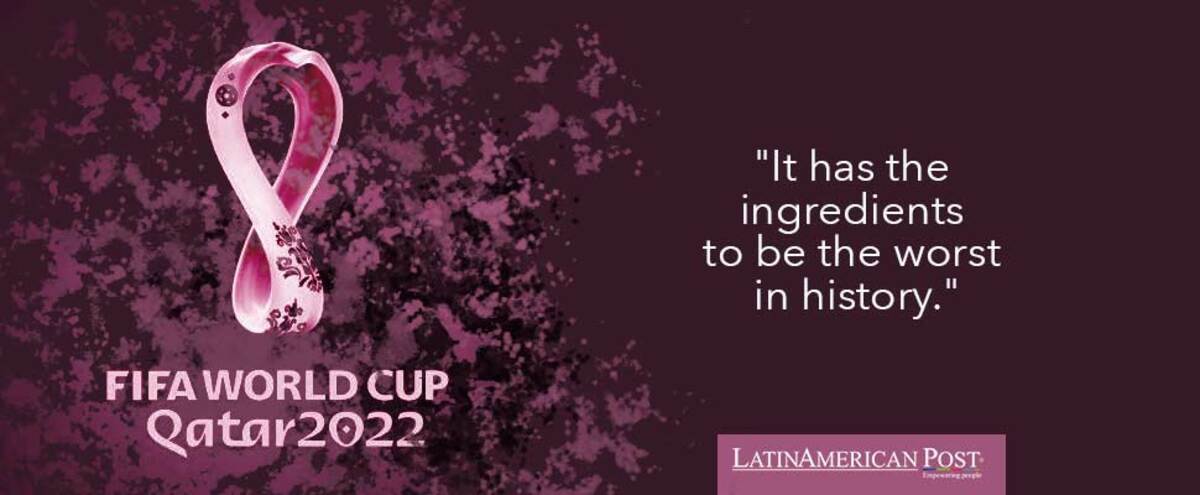Opinion: Will Qatar 2022 Be the Worst World Cup?
The Qatar 2022 World Cup, which starts today, has the ingredients to be the worst in all of history .

Photo: Latin American Post
LatinAmerican Post | Santiago Gómez Hernández
Listen to this article
Leer en español: Opinión: ¿Será Catar 2022 la peor Copa del Mundo?
Today, the whole world celebrates the opening of the most important sporting event in the world. A tournament that is seen by more than a billion people around the globe and that is the peak of sportsmanship, nationalism, mysticism and good football.
However, we are facing what will be, very surely, the worst World Cup in history. The latest appearance of Cristiano Ronaldo and Lionel Messi (arguably the greatest soccer players in history), is marred by claims of discrimination, homophobia, Islamophobia and human rights.
Since the very election of Qatar as the venue for the World Cup, it has been officially and unofficially confirmed that several FIFA members who voted in favor of the emirate as the venue did so after receiving direct or indirect bribes. The discriminatory laws, the climatic conditions, the little soccer culture or the few local populations were not enough reasons to choose a better location… today it is known that money played a more important role than thought.
A considerable part of the criticism comes from the West. Discriminatory laws against people from the LGBT+ community is one of the main facts. So much so that many federations have expressed their desire to protest against these rules.
It was no secret that the emirate is an Islamic monarchy, and bases its civil laws on religious norms, so it has a strict penal code compared to numerous liberal democracies. It was precisely since the election of Qatar as the world headquarters that critical voices did not wait and warned how counterproductive an event the size of a World Cup would be with the discriminatory legal framework that the country had.
Furthermore, it is true that foreign fans are visitors to Qatar, but it was the Arab country that decided to host this event in which people from all over the planet will arrive. Discriminatory laws against any population are valid if rejected. If you are a visitor, you comply with the rules of the house, but if you lend your house for the party, it is not worth discriminating against your guests later.
Defending Qatar and the Muslim World
For their part, the emirate and several Muslim Internet users defend this position of "respecting Qatari laws and regulations", assuring that their laws, with a discriminatory orientation against the LGBT+ community, are part of their religion. Although it is an insufficient response, it is also not far from thinking that there is an Islamophobic sector that attacks Qatar for the very fact of its religion. An example of this was the disparity of many critics between the current World Cup and the past, held in Russia. 4 years ago, the venue for the event was also a country accused of its discriminatory laws. However, the voices were not the same as those we see today. Four years ago, the difference in laws in Russia was accepted, and few activist groups were those who criticized discrimination. There was no football federation willing to protest symbolically.
Also read: The Curses of the Qatar 2022 World Cup. Will Any Be Broken?
But understanding that there are Islamophobic voices that today share the discourse against Qatar does not mean that discrimination in the Arab country is compatible with a soccer World Cup. Neither Russia nor Qatar can hold events that invite all the fans on the planet, if these visitors risk going to jail for their creed, sexual orientation, gender or race.
Celebrating the World Cup in Qatar or Russia is like having celebrated it in Apartheid South Africa. International events must be taken to the whole world, but not over discriminated populations. We are not talking about whether equal marriage is approved in Qatar, we are talking about a country that gives 10 years in prison to homosexuals.
Even today, Qatar would suddenly refrain from celebrating this World Cup. The emirate's decision to host this event and spend billions of dollars in investment was thinking about improving the country's image as a tourist destination. Today the opposite is happening, there is more talk about scandals than about the architectural marvels that the emirate invented to host this festival. They believed that a soccer World Cup would be similar to hosting a Tennis Grand Prix or a major tennis event.
A more critical population than that of 4 years ago, with rights achieved and with a more unbreakable will, was not under Qatar's calculations. Before, homosexuality had been taboo in football. A macho and homophobic culture had been characteristic of this game. Today, international pressure is not only from activist groups, there are also several soccer players, ex-soccer players, and federations that monopolize the voices most critical of the Qatari regime.
It is clear that if Qatar was not willing to receive different cultures and people, it was not the right venue to celebrate the World Cup. But this is not only for LGBT+ rights reasons, but for many other inconveniences.
Fatal work accidents unfortunately accompany large constructions. According to data from Deutsche Welle, the deaths in the construction of the infrastructure for the stadiums of Qatar 2022 is 40. A higher figure than those of the past world cups (South Africa with 2, Brazil with 8 and Russia with 22), but less than the 6,500 reported by other media. According to the German outlet, these 6,500 workers are migrants from 5 Southeast Asian countries who have died in Qatar in the last decade, regardless of whether they were related to stadium construction or not.
However, although the vast majority of deaths are not related to the soccer event, 6,500 dead immigrants is a reflection of the precarious conditions in which immigrant labor lives or works in a country that depends on other nationalities to meet its labor needs.
Even recently, there have also been several acts of attempted censorship by Qatar of the international press. The World Cup had not yet started, and already members of the Danish television station TV2 denounced intimidation by Qatari officials while they were covering the event. Definitely, Qatar was ready in terms of infrastructure and money, but it was not ready in terms of social, legal, and personnel training.




